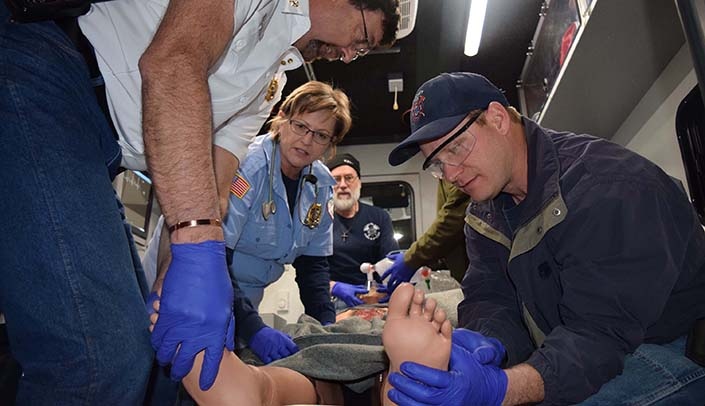The UNMC Simulation in Motion-Nebraska program (SIM-NE) recognized a milestone Jan. 15 when it conducted its 250th free training session.
UNMC, which has trained 4,700 health professionals to date covering 87 of 93 Nebraska counties, conducted training for volunteers in Sutherland, Neb., for the Sutherland Fire and Rescue and the Hershey (Neb.) Volunteer Fire Department. UNMC officials presented a plaque to recognize the milestone.
SIM-NE is a statewide, mobile education system that takes state-of-the-art, hands-on training to emergency medical service providers in rural areas across the state, including health professionals in hospitals. SIM-NE provides free training using four, 44-foot-long, customized trucks that supply mobile, real-life experiences designed to enhance lifesaving skills for those in rural areas.
SIM-NE’s four trucks were launched in June 2017 and stationed in Scottsbluff, Norfolk, Kearney and Lincoln. Rather than having learners travel to larger cities, the training is at the request of rural emergency medical service agencies and critical access hospital staff and is done in their communities. This also allows training to be team-based as learners train side-by-side with the people they normally work with during a response.
“As a resource for the state of Nebraska, the University of Nebraska Medical Center celebrates this milestone that supports Nebraska’s rural emergency medical services,” said UNMC Chancellor Jeffrey P. Gold, M.D. “The lifesaving training emergency medical specialists and other health professionals ask us to provide helps their communities remain engaged and productive. These services provide state-of-the-art education and training at no cost, which contributes to the health and economy of this great state.”
Paul Paulman, M.D., a native of Sutherland, said the training programs offered by SIM-NE have benefitted first responders and others in all parts of Nebraska. “Thanks to the Simulation in Motion-Nebraska team for their diligence, enthusiasm, and professionalism which has allowed us to reach this training milestone,” said Dr. Paulman, assistant dean for clinical skills and quality at UNMC and principal investigator of the grant that established SIM-NE. “Because of the work of this team, the people of Nebraska are safer.”
The customized trucks feature dual slide-out room extensions, a simulated emergency room and ambulance, a control room, as well as high-tech, computerized patient simulators that talk, breathe, have heartbeats, and can react to medications and other actions of the learners.
Each mobile unit is equipped to recreate a realistic environment for learners including medical supplies, pre-programmed computerized medical and trauma scenarios; monitors that display vital signs of patient simulators; heart monitors/defibrillators; audio and video recording/playback capabilities and mock drugs.
“SIM-NE has been a huge success in providing education to Nebraska Emergency Medical Services,” said Sandra Lewis, president of the Nebraska Emergency Medical Services Association (NEMSA). “The program has provided real-life scenarios to departments who could not possibly afford this kind of extensive training. The association is grateful for this program and for those who have continued to help fund SIM-NE. SIM-NE helps fulfill the educational mission of NEMSA to all Nebraska EMS providers.”
“Thanks to UNMC’s SIM-NE, rural areas of the state are receiving outstanding training in EMS,” said Wynn Wiens, Hooker County Sheriff/EMT. “In addition, they opened my eyes for the need of Narcan (nasal spray that blocks or reverses the effects of opioid medication) in rural areas. Before the training, I didn’t see a need for rural agencies to carry it. Now, both the sheriff’s office and the EMS squad have it.”
SIM-NE is part of UNMC’s Interprofessional Experiential Center for Enduring Learning (iEXCEL), a transformative program being created to revolutionize health care education and training. The goal is to improve quality and safety and reduce costs of patient care through practicing, honing, and improving patient care skills using simulation before encountering real patients, as well as learning to work as high-functioning teams.
SIM-NE was initially funded with a $5.5 million grant from The Leona M. and Harry B. Helmsley Charitable Trust. The funding supported four SIM trucks, equipment, patient simulators, supplies and operational expenses for the first three years allowing training to be at no cost for EMS providers and critical access hospital staff. Partners and funders are being sought to sustain the training program.
Rural emergency medical service agencies and critical access hospitals can request training here. For more information, email sim-ne@unmc.edu or call (402) 559-4863.

Congratulations and keep up the good work!